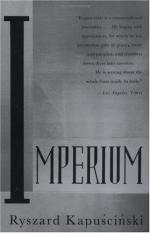|
This section contains 545 words (approx. 2 pages at 400 words per page) |

|
Imperium Summary & Study Guide Description
Imperium Summary & Study Guide includes comprehensive information and analysis to help you understand the book. This study guide contains the following sections:
This detailed literature summary also contains Topics for Discussion and a Free Quiz on Imperium by Ryszard Kapuściński.
Ryszard Kapuscinski was a widely renowned Polish journalist whose work has been praised across the world for its striking realism and well-composed prose. His literary journalism is considered among the best of its time. In Imperium, Kapuscinski describes his encounters with the Soviet Union during the height of Stalinism and periodically until the fall of the Soviet Union in 1991 and soon thereafter.
Kapuscinski is a critic of the Soviet regime though he rarely rails against it explicitly. Instead, he simply reports the horrific crimes perpetrated by the USSR's government on its own people and on the peoples of the other Soviet republics. He also focuses on the psychological effects of Soviet rule on all the peoples of the USSR. Kapuscinski displays an interest in post-colonial sociology or the study of the psychology of groups of people that were colonized by a greater power, their culture, language, nationalist sentiment, and the like, and that same psychology following the removal of the colonial power.
Accordingly, Kapuscinski focuses primarily on the effects of 'Sovietization' and the fall of the Soviet Union on the greater Soviet republics like Armenia, Azerbaijan, and Turkmenistan along with the peoples of particularly oppressed cities like Vorkuta. In Kapuscinski's view, the Soviet Union was one of the most terrifying and brutal regimes in human history who took advantage of the psychologies of peoples who were already inclined to bow to authority and live in fear. It is for this reason that Kapuscinski refers to the Soviet government as 'The Imperium.'
Imperium divides into three parts. Part I, First Encounters (1939-1967) describes Kapuscinski's first three encounters with the Soviet regime. Chapter 1, 'Pinsk '39', takes place in Kapuscinski's childhood in his hometown of Pinsk in what is now Belarus. Kapuscinski and his family were on the run from the Soviet government as were many of his fellow townspeople. Chapter 2, 'The Trans-Siberian' describes a trip Kapuscinski took across Russia on the Trans-Siberian railroad. Chapter 3, 'The South' describes Kapuscinski's extended journey across the southern Soviet republics, including Armenia, Georgia, Azerbaijan and Turkmenistan.
Part II, From a Bird's Eye View (1989-1991), is by far the largest part of the book with twelve chapters. In Chapter 4, 'The Third Rome' Kapuscinski describes the weakening power of the Soviet government in 1989 and his visit to Moscow. Chapter 5, 'The Temple and the Palace' describes the building of The Temple of Christ the Savior and Stalin's destruction of it. Chapter 6, 'We Look, We Cry' focuses primarily on the history of the Armenian people, its domination by the Soviets and rising nationalist sentiment in the face of Soviet collapse. Subsequent chapters cover other Soviet republics, peoples and cities including Vorkuta, the Bashkirs, Kolyma, Azerbaijan and Drohobych.
Part III, The Sequel Continues (1992-1993) is simply an epilogue written in 1994 following the collapse of the Soviet Union. Kapuscinski explains how the events of 1985 with the rise of Gorbachev and the subsequent events following his rule led to the collapse of the Soviet Union. He reflects on how the peoples of the Imperium have handled decolonization. Nationalist sentiment has arisen which is partly destructive and while there are many instabilities there are many good things as well. Kapuscinski thinks that the peoples of the Imperium have reason to hope for their futures.
Read more from the Study Guide
|
This section contains 545 words (approx. 2 pages at 400 words per page) |

|



